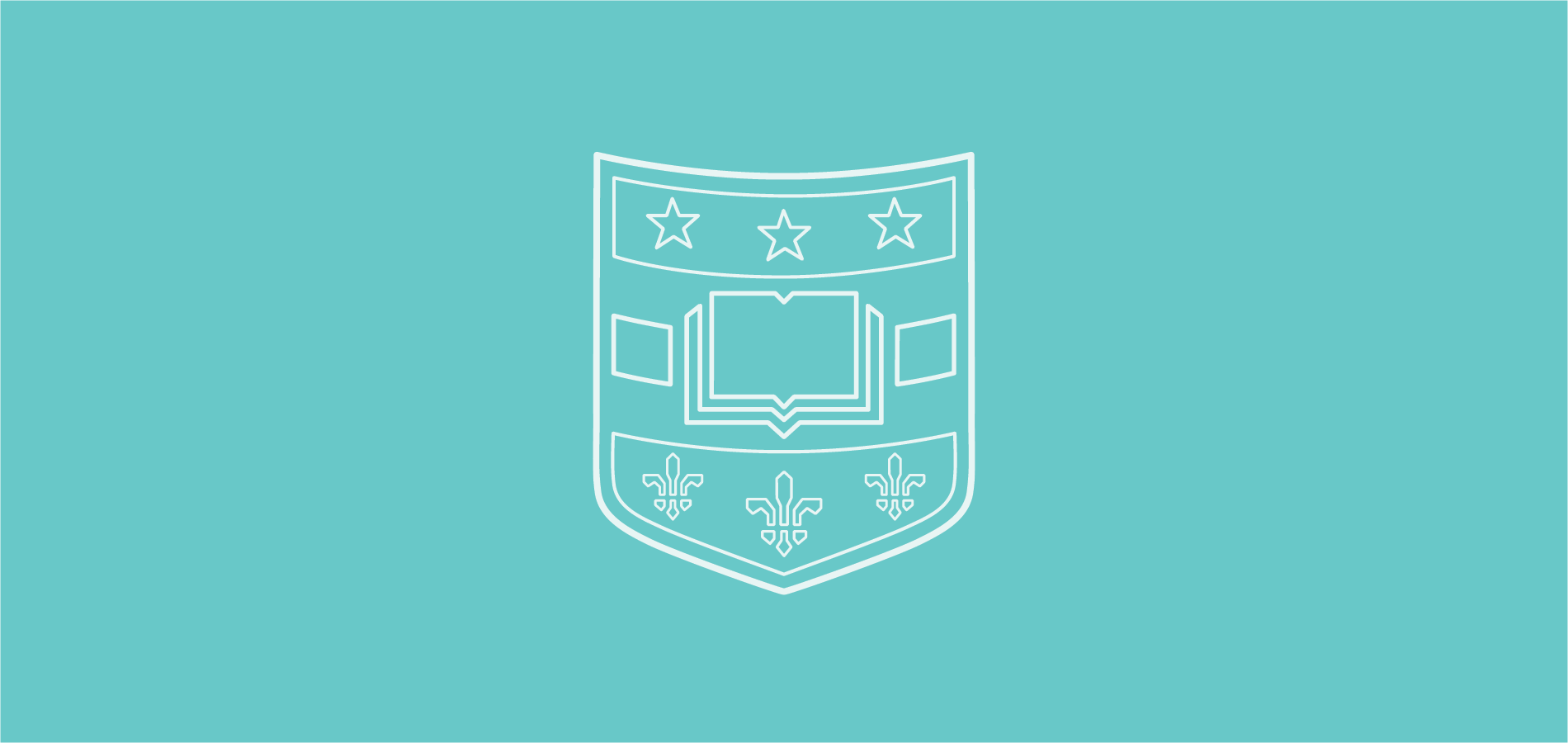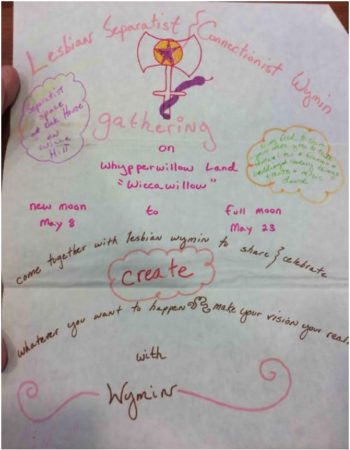
Finding the ‘L’ in ‘LGBTQ’: Part 2
In celebration of Pride Month, the Special Collections Blog is highlighting a few of Washington University Libraries’ collections that are related to LGBTQ issues and activism. The following is a continuation of a guest post by Wash U undergraduate Jackie Feldman, who researched a Washington University lesbian student group for an independent study course.
Finding the ‘L’ in ‘LGBTQ’: Part 2
Read Finding the ‘L’ in ‘LGBTQ’: Part 1
D.Y.K.E.S. stands for “Do You Keep Echoing Sappho?” and was a Washington University student group for lesbians and others who cared about lesbian issues. It was founded in 1985 and ran through at least 1987. Their statement of purpose asserts, “We challenge societal myths about lesbians through political activities and educational programming we wish to create an environment of tolerance and understanding for lesbian lifestyles on the Washington University campus” (“Constitution,” found in D.Y.K.E.S. journal). The evidence of their group that exists in the Washington University archives is a journal kept by the leaders of the group, in which they wrote back and forth to one another in order to plan programming, discuss ideas, and take notes from meetings.
D.Y.K.E.S. was a lesbian-focused space, but not a separatist one. At times, this could lead to tension—for example, in the notes from a discussion on combating homophobia, one writer comments, “We talked more @ both gays + lesbians than just lesbians than Joyce would have liked, + Shannon used the word homophobia, not lesbophobia” (D.Y.K.E.S. journal). Joyce likely refers to Joyce Trebilcot, a lesbian separatist and the then-director of the Women’s Studies Program. Separatist influences were present in the group’s way of thinking, but were not embraced by all members throughout their discussion. However, these ideas were given weight and value. The notes don’t carry judgement, but simply mark both sides of the conversation. While the group discussed other gay people and the issues that impacted them, members took advantage of the opportunity to discuss these issues from a lesbian standpoint, incorporating multiple lesbian perspectives.
Separatist Community
One unique opportunity that was only possible in a lesbian group was their visit to a nearby separatist community. Before discussing D.Y.K.E.S.’s experience with the separatist community, it’s important to visit the historical baggage that it carries. The history of lesbian separatism’s exclusion of trans women and non-binary people also accounts for a growing, and deserved, modern discomfort with the separatist movement. Many also argued that lesbian separatism was for white, middle-class women. The inherent prioritization of lesbian issues failed to address the needs of some women of color. For example, the Combahee River Collective argued that “our situation as Black people necessitates that we have solidarity around the fact of race… We struggle together with Black men against racism, while we also struggle with Black men about sexism” (Combahee River Collective Statement). Sid Spinster argued back against the critique of lesbian separatism as exclusionary, pointing out the ways in which a separatist rejection of patriarchy could also be a rejection of racism and classism as these systems reinforce one another, demanding:
It’s time for non-Separatist Lesbians to start explaining yourselves. What does it mean to not be a Separatist in “our” movement? What is your strategy for the defeat of patriarchy over the long haul? Can you honor the choice of Separatist wimmin of color not to work with men? Is it racist not to be a Separatist; not to withdraw your support from patriarchy, not to fight for an anti-racist Lesbian-identified culture?
Spinster, in Penelope’s “The Mystery of Lesbians: III”
Realistically, the politics of lesbian separatism were in some ways inaccessible or unwelcoming to poor women and women of color, though many separatists did attempt to combat racism and classism. Some prominent separatists were women of color, and some separatists saw their politics as intersectionally combating different forms of oppression. The implementation of inclusivity was attempted, but imperfect. Inevitably, lesbian separatism could not meet the needs of all lesbians. As cultural feminism overtook radical feminism, more radical lesbian politics have perhaps felt less urgent, and the need for separatism appears diminished. While I can’t attempt to fully account for the disappearance of ‘L’ as a category, I want to note the ways in which D.Y.K.E.S. grappled with separatism and what it meant to them to be a distinctly lesbian student group.
D.Y.K.E.S. was not a separatist group, as they did not fully embrace separatist theory, as they lived and studied with men as students at Washington University. However, they still engaged with separatism both theoretically and practically. They planned a trip to a separatist community, and at a club meeting read and discussed work by Julia Penelope, a prominent lesbian theorist who advocated for separatism. They also considered trying to get Julia Penelope to come to campus, but there is no evidence that they succeeded in 1985, though in 1987 she taught at Washington University while on leave from the University of Nebraska (The Gay News Telegraph, August 1987). Penelope’s stance was firm: in “The Mystery of Lesbians: III,” she claims,
Separatists have steadfastly maintained, even those (like myself) who have, on occasion, worked in coalition, that MEN ARE THE ENEMY. We’ve insisted that our primary commitment is to Lesbians (or, for some, to wimmin in general).
Penelope, emphasis original
It doesn’t come as much of a surprise, then, that the notes from the D.Y.K.E.S.discussion found Penelope’s work “very angry—some found offensive tone” (D.Y.K.E.S. journal).D.Y.K.E.S. was not ready to wholly embrace separatism.
D.Y.K.E.S. and the Whypperwillow Community
Despite limits on actualizing separatism, D.Y.K.E.S. still engaged with it. Not only did they read about separatism, they also met and organized with a nearby separatist community, known by both Whypperwillow and Wiccawillow. Flyers advertised, “come together with lesbian wymin to share & celebrate / whatever you want to happen & make your vision your reality with wymin,” and, “Gather with us to celebrate with wymin and the land, and share your incites [sic], visions, and words as we create our wimminz culture close to the earth and to each other” (Flyers in D.Y.K.E.S. journal). It’s unclear whether these documents were created by members of D.Y.K.E.S. or of Whypperwillow, but their placement inside the D.Y.K.E.S. journal alongside members of D.Y.K.E.S.’s own accounts of visiting the community show a connection between the groups.

A highlight of the relationship between D.Y.K.E.S. and the Whypperwillow community was a student visit to the land. One participant in the trip wrote a four-page reflection, which enthusiastically began, “Oooo! Aaaa! Wimmin’s land” (D.Y.K.E.S. journal). During the trip, the visitors mainly interacted with the physical space of the land, though they spent some time with members of the community. The writer notes, “much of our time was spent on the interaction amongst ourselves, the 4 visitors. I was very pleased with our group dynamics. We did well together—sharing in work, food, time, happiness. Just being out on the land was bliss, but we also wanted to rap with the wimmin living there.”(D.Y.K.E.S. journal). Her descriptions show their incomplete integration into the community, and how the visit functioned as an experience for the visitors as opposed to an attempt to truly live a separatist lifestyle. The writer giving her account of the trip, however, still found it meaningful and inspiring. She concludes, upon returning to St. Louis,
I personally did not have a sense of leaving. I feel, instead, that the experiences + attitudes are now a part of me, helping me go forward with my life. The time spent at Whypperwillow was deeply moving. I will journey there again, if only in spirit for the time.
D.Y.K.E.S. journal
While not expecting to enter a separatist community, their time there remained informative and meaningful as an experience that connected them to other lesbians.
Recognizing “L”
This visit to a separatist community could only occur in a group that prioritized lesbians. As discussed, D.Y.K.E.S. was not separatist in the traditional understanding of the term—as individuals they interacted with men and non-lesbians, and as a group their membership was technically open to all who were interested in supporting their goals, not limited to women or lesbians. However, their continued interactions with and interest in separatism show that the political philosophy held power.
Clearly, lesbian identity was meaningful to members of D.Y.K.E.S. Seeing lesbianism recognized and validated by a group of individuals who chose to center their lives around lesbianism held immense power, especially to a group of relatively young college students. While D.Y.K.E.S. members were largely unprepared to take such a radical stance, witnessing separatism gave them a vision for what it could look like to center lesbian experience. Separatism had the power to shape their politics and outlook and further reinforce the importance of lesbian-centered activism.
Works Cited
- Combahee River Collective. “The Combahee River Collective Statement.” April 1977.
- Penelope, Julia. “The Mystery of Lesbians: III.” From Lesbian Ethics Vol 1. No 3, 1985. Reproduced on feminist-reprise.org. Accessed May 7, 2018. <http://feminist-reprise.org/library/resistance-strategy-and-struggle/the-mystery-of-lesbians-iii/>.
- Sweet, Nan and Carla Flanagan. “Julia Penelope Interview.” The Gay News Telegraph-Magazine August 1987. Accessed May 2018.
- Washington University Special Collections. “D.Y.K.E.S. Do you keep echoing Sappho?” Journal. Washington University Women’s Resource Center. Series 01: Scrapbooks, Journals, and miscellaneous. Box 02. WUA00114.